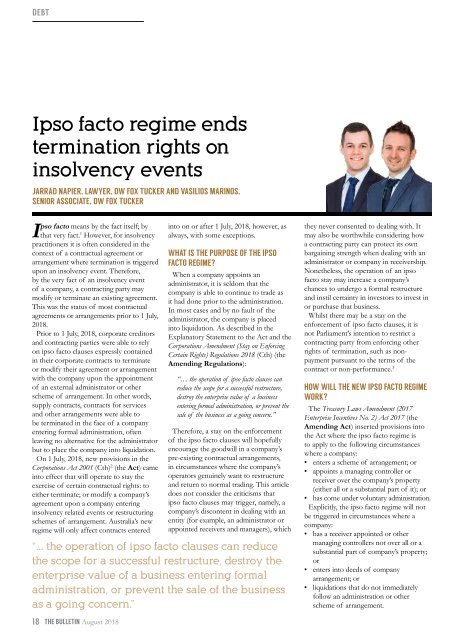The Bulletin August 2018
Create successful ePaper yourself
Turn your PDF publications into a flip-book with our unique Google optimized e-Paper software.
DEBT<br />
Ipso facto regime ends<br />
termination rights on<br />
insolvency events<br />
JARRAD NAPIER, LAWYER, DW FOX TUCKER AND VASILIOS MARINOS,<br />
SENIOR ASSOCIATE, DW FOX TUCKER<br />
Ipso facto means by the fact itself; by<br />
that very fact. 1 However, for insolvency<br />
practitioners it is often considered in the<br />
context of a contractual agreement or<br />
arrangement where termination is triggered<br />
upon an insolvency event. <strong>The</strong>refore,<br />
by the very fact of an insolvency event<br />
of a company, a contracting party may<br />
modify or terminate an existing agreement.<br />
This was the status of most contractual<br />
agreements or arrangements prior to 1 July,<br />
<strong>2018</strong>.<br />
Prior to 1 July, <strong>2018</strong>, corporate creditors<br />
and contracting parties were able to rely<br />
on ipso facto clauses expressly contained<br />
in their corporate contracts to terminate<br />
or modify their agreement or arrangement<br />
with the company upon the appointment<br />
of an external administrator or other<br />
scheme of arrangement. In other words,<br />
supply contracts, contracts for services<br />
and other arrangements were able to<br />
be terminated in the face of a company<br />
entering formal administration, often<br />
leaving no alternative for the administrator<br />
but to place the company into liquidation.<br />
On 1 July, <strong>2018</strong>, new provisions in the<br />
Corporations Act 2001 (Cth) 2 (the Act) came<br />
into effect that will operate to stay the<br />
exercise of certain contractual rights: to<br />
either terminate; or modify a company’s<br />
agreement upon a company entering<br />
insolvency related events or restructuring<br />
schemes of arrangement. Australia’s new<br />
regime will only affect contracts entered<br />
18 THE BULLETIN <strong>August</strong> <strong>2018</strong><br />
into on or after 1 July, <strong>2018</strong>, however, as<br />
always, with some exceptions.<br />
WHAT IS THE PURPOSE OF THE IPSO<br />
FACTO REGIME?<br />
When a company appoints an<br />
administrator, it is seldom that the<br />
company is able to continue to trade as<br />
it had done prior to the administration.<br />
In most cases and by no fault of the<br />
administrator, the company is placed<br />
into liquidation. As described in the<br />
Explanatory Statement to the Act and the<br />
Corporations Amendment (Stay on Enforcing<br />
Certain Rights) Regulations <strong>2018</strong> (Cth) (the<br />
Amending Regulations):<br />
“… the operation of ipso facto clauses can<br />
reduce the scope for a successful restructure,<br />
destroy the enterprise value of a business<br />
entering formal administration, or prevent the<br />
sale of the business as a going concern.”<br />
<strong>The</strong>refore, a stay on the enforcement<br />
of the ipso facto clauses will hopefully<br />
encourage the goodwill in a company’s<br />
pre-existing contractual arrangements,<br />
in circumstances where the company’s<br />
operators genuinely want to restructure<br />
and return to normal trading. This article<br />
does not consider the criticisms that<br />
ipso facto clauses may trigger, namely, a<br />
company’s discontent in dealing with an<br />
entity (for example, an administrator or<br />
appointed receivers and managers), which<br />
“… the operation of ipso facto clauses can reduce<br />
the scope for a successful restructure, destroy the<br />
enterprise value of a business entering formal<br />
administration, or prevent the sale of the business<br />
as a going concern.”<br />
they never consented to dealing with. It<br />
may also be worthwhile considering how<br />
a contracting party can protect its own<br />
bargaining strength when dealing with an<br />
administrator or company in receivership.<br />
Nonetheless, the operation of an ipso<br />
facto stay may increase a company’s<br />
chances to undergo a formal restructure<br />
and instil certainty in investors to invest in<br />
or purchase that business.<br />
Whilst there may be a stay on the<br />
enforcement of ipso facto clauses, it is<br />
not Parliament’s intention to restrict a<br />
contracting party from enforcing other<br />
rights of termination, such as nonpayment<br />
pursuant to the terms of the<br />
contract or non-performance. 3<br />
HOW WILL THE NEW IPSO FACTO REGIME<br />
WORK?<br />
<strong>The</strong> Treasury Laws Amendment (2017<br />
Enterprise Incentives No. 2) Act 2017 (the<br />
Amending Act) inserted provisions into<br />
the Act where the ipso facto regime is<br />
to apply to the following circumstances<br />
where a company:<br />
• enters a scheme of arrangement; or<br />
• appoints a managing controller or<br />
receiver over the company’s property<br />
(either all or a substantial part of it); or<br />
• has come under voluntary administration.<br />
Explicitly, the ipso facto regime will not<br />
be triggered in circumstances where a<br />
company:<br />
• has a receiver appointed or other<br />
managing controllers not over all or a<br />
substantial part of company’s property;<br />
or<br />
• enters into deeds of company<br />
arrangement; or<br />
• liquidations that do not immediately<br />
follow an administration or other<br />
scheme of arrangement.


















